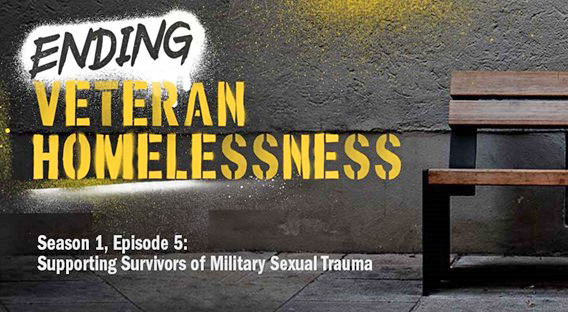This story discusses military sexual trauma (MST). It’s an important but sensitive and potentially intense topic. If reading about or listening to this episode of Ending Veteran Homelessness will be too much for you, please skip it. If you need someone to talk to, call the Veterans Crisis Line: dial 988 and press 1.
Military sexual trauma is the term VA uses to refer to sexual assault or harassment that occurred during a person’s military service.
This month on Ending Veteran Homelessness, we discuss MST and its impact on Veteran homelessness with three experts: Dr. Jessica Keith, clinical programs and practices lead for VA’s MST Support Team; Dr. Ryan Holliday, clinical research psychologist at the Rocky Mountain MIRECC for Suicide Prevention; and Adelaide Kahn-Fowler, director of programs and policy at Protect Our Defenders.
Listen to “S1EP5: Supporting Survivors of Military Sexual Trauma” on Spreaker.
The conversation is critical but also somewhat rare. As sexual assault and MST are uncomfortable and inherently painful subjects, we tend to avoid talking about them as a society.
This lack of public awareness about MST leaves gaps in our national discourse. Too often, these gaps are filled with harmful myths. By dispelling these myths, we help survivors of MST know they are not alone and we connect them to the resources they need and deserve.
Myth: MST occurs only in military settings
Fact: MST is defined as any sexual activity during military service in which a person is involved against their will. MST can occur on or off military bases, and when a service member is on or off duty. Perpetrators can be fellow service members, civilians, family members and strangers alike.
Myth: MST only impacts women
Fact: VA’s universal MST screening program, which screens every Veteran seen for health care at VA, finds that 1 in 3 women and 1 in 50 men respond “yes” when asked by their provider if they experienced MST.
People in all groups have experienced MST.
While rates of women who report MST are higher, there are more men in the military and the number of men and male-identifying service members and Veterans who experienced MST remains significant.
“We know that people of all genders, ages, sexual orientations, racial and ethnic backgrounds, physical sizes and abilities, ranks, eras, and branches of service have experienced MST,” says Keith.
Myth: All Veterans respond to MST in the same way
Fact: “Veterans are diverse and their responses to MST are too,” Keith reminds us. The consequences of MST can present differently among Veterans.
Chronic pain, gastrointestinal distress, and sexual health concerns are common physical health issues associated with MST.
MST is associated with various mental health diagnoses, including post-traumatic stress disorder, depression, anxiety and substance use disorders. Making time to learn about MST is especially crucial during Suicide Prevention Awareness Month, as MST is associated with an increased risk of suicide.
Holliday shares that survivors are more likely to experience challenges reintegrating to civilian life. Examples of these elevated psychosocial stressors may include trouble sustaining permanent housing, employment and relationships.
Research shows that experiences of interpersonal violence and MST are more common among Veterans experiencing homelessness.
Myth: Veterans must qualify for other VA care to receive MST-related treatment
Fact: All VA medical centers and community-based Vet Centers provide MST-related services that are 100% confidential and free of charge for Veterans experiencing conditions related to MST. Additionally, VA offers treatment in residential and inpatient settings for individuals who need more intensive treatment. No matter where a Veteran receives care, they can request a clinician of the gender they are most comfortable with.
Importantly, Veterans do not need to have reported the MST when it happened or have any documentation of the MST. Veterans can receive care even if they do not currently qualify for other VA services.
Myth: MST is only a Veteran issue
Fact: Though MST is experienced by individuals who have served in the military, our service members and Veterans are not isolated—they are integral members of our communities, families and workplaces. When those who treat Veterans understand the impact of MST, they can provide more effective, holistic and trauma-informed care. When the public knows about the VA resources available, we can be prepared to help those in need.
As we work to erase the stigma surrounding MST, survivors will feel more empowered to seek care and support. Breaking the cycles of trauma related to MST will help prevent countless Veterans from experiencing homelessness in the nation they served.
Our Veterans have dedicated their lives to supporting us, now it’s our turn to do the same for them.
Learn about VA programs
- Learn more about MST.
- Learn about available VA treatment options and how to access free MST-related care at VA.
- Find your nearest Military Sexual Trauma Coordinator.
- Information to help health care providers better assist a patient with physical or mental health difficulties related to an experience of MST.
- Read about VA Suicide Prevention Resources.
- Contact the Veterans Crisis Line for free, confidential support, 24 hours a day, 7 days a week, 365 days a year. Dial 988 and press 1, chat online, or text 838255.
- Veterans who are homeless or at risk for homelessness should contact the National Call Center for Homeless Veterans at 877-4AID-VET (877-424-3838).
- Visit the VA Homeless Programs website to learn about housing initiatives and other programs for Veterans exiting homelessness.
- Check out the Ending Veteran Homelessness podcast to learn more about what VA is doing about Veteran homelessness.
Topics in this story
Link Disclaimer
This page includes links to other websites outside our control and jurisdiction. VA is not responsible for the privacy practices or the content of non-VA Web sites. We encourage you to review the privacy policy or terms and conditions of those sites to fully understand what information is collected and how it is used.
More Stories
Bob Jesse Award celebrates the achievements of a VA employee and a team or department that exemplifies innovative practices within VA.
The Medical Foster Home program offers Veterans an alternative to nursing homes.
Watch the Under Secretary for Health and a panel of experts discuss VA Health Connect tele-emergency care.








Its TRUE, everyone that treats us at VA have assess to any and all of our records. I’m so fed up with this kind of exposure. You cant tell me that a med student doesn’t go out in there world and keeps this information to them self. NO I believe they get a kick out of the responses there friends show. Not only did I experience MST I took it to court, I had to blow my testimony DUE to other soldiers threats To me and my family. On top of MST I have the anger of that. How fair is it…. All my military career I never ventured out to a sexual encounter out side my marriage. ANGER yes , Trust my records in the VA No they are a open book.
RIGHT ON!!!!!!
My name is Elizabeth Mayho I was raped in the navy over 30 years ago. I am now 58 it has consumed my entire life. I subsequently was discharged under other than honorable conditions with no benefits. I was told by my offender nobody would believe me e because he had rank over me and if they did I would be in my trouble because he e was married. I never ER drank, to smoked or used any type of f drugs. Subsequently I returned home different with everyone wanting to know what happened. I drank. smoked a and have had a on again off again relationship with drugs my. I have attempted suicide on several occasions homeless several times (currently) . MST support is a joke as well as the process of getting disability benefits if you are a victim of Mst.
“All VA medical centers and community-based Vet Centers provide MST-related services that are 100% confidential…” that’s a joke. EVERYONE who works at the VA that has access to records can read ALL the appointments and notes from those appointments. I even had a Neurology med student tell me she read my Secure Message to my therapist. “100% confidential” is 100% bullcrap.